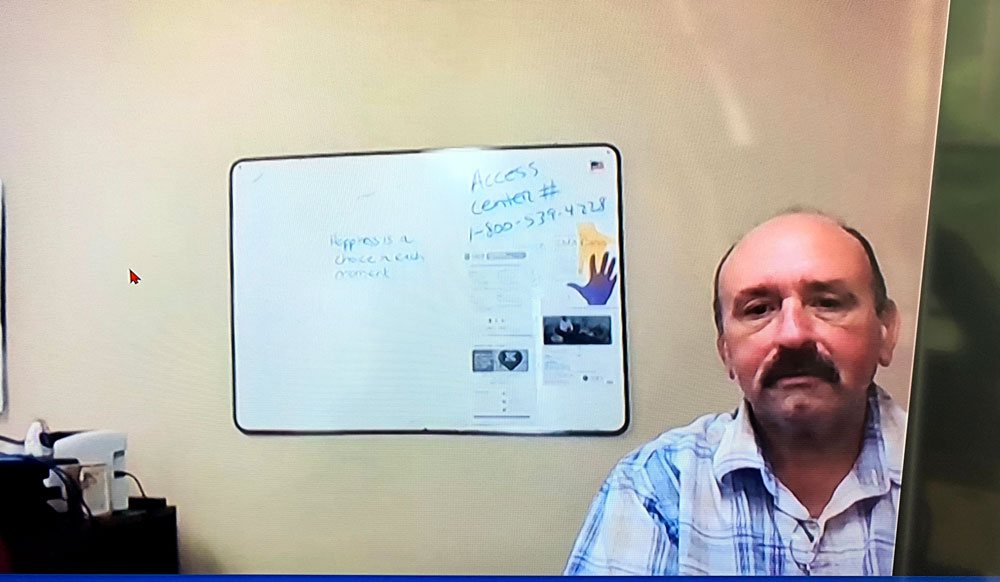
Richard Dunn, the former Palm Coast resident found not guilty by reason of insanity in the gruesome killing of his elderly father in 2006, will be allowed out of a state psychiatric hospital and back to the Daytona Beach halfway house where he lived for several years before he started acting bizarrely again a year ago.
The prosecution and his defense attorney, John Hager, agreed to the order in a joint stipulation filed on Oct. 17. He was returned to Stone Soup Ministries as long as he remained on all his prescribed medication, participated in substance abuse treatment–he has been a pot smoker and had been a heavy drinker–and therapy. The North Florida Evaluation and Treatment Center–the state psychiatric hospital in Gainesville, run by the Department of Children and Families–recommended the discharge to a less restrictive environment on Sept. 1.
Circuit Judge Terence Perkins signed the order, restoring all previous conditions of Dunn’s probationary status and court supervision.
For Dunn, it’s essentially back to just past Square One, after he had come close to regaining his full freedom in 2021.
Dunn stabbed his father to death in the Dunn family home on Clarendon Court South in Palm Coast in January 2006. His father, Jack Dunn, 89, had been the first physician to open a family practice in Palm Coast’s early days. Dunn told a jail corrections deputy that he killed his father because he’d been sick for years and he couldn’t take it anymore–he called the killing a “Christian mercy”–then wrote his confession on a jail form (“I killed my dad”), drawing a heart next to the word “dad.”
A graduate of the University of Florida with a communications degree, he was given a diagnosis of schizoaffective disorder with a history of bipolar affective disorder. He had a history of treatment and several hospital stays since he was 23, including Baker Acts. He’d been known to use his vehicle to bump other cars off the road.
He was 45 at the time of the killing. Once found competent to proceed, then-Circuit Judge Kim Hammond found him not guilty by reason of insanity in a non-jury trial and committed him to a state hospital, where he remained until 2012. He was then allowed to live at Free Spirit Transitional Housing in Daytona Beach, but forbidden to travel to Flagler County.
With minor setbacks, over time he appeared to progress well enough that in a series of hearings in 2020 and 2021 before Perkins, Dunn was convincing the court and his supervisors that he was healthy enough to regain his independence, free of supervision. “Why is everyone under the inclination that as soon as I’m cut free, I’m going to jump off a bridge and kill somebody?” he’d asked the judge in June 2021.
But by last September, he was scrawling strange things on his door, visiting a caretaker at her home at 2 a.m., uninvited, appearing at his counseling appointments with an unexplained burn–and smoking pot again, which landed him in jail. A pot bust would not usually keep someone in jail. Prosecutors used the probation violation to keep him there as the court figured out what to do. Last January, he was re-committed to the hospital, with hopes that he could be stabilized with drugs and returned to his halfway house. That has now happened. But his road to full freedom may have to wait a long time.
Dunn’s return to Daytona Beach nearly coincides with an apparently similar case that unfolded last week within blocks of the Clarendon Court home where Dunn had ended his father’s life: 19-year-old Luke Ingram’s alleged killing of his elderly grandfather on Clermont Court during what may have been a schizophrenic episode. Ingram is at the Flagler County jail facing a second degree murder charge, among other charges.
![]()





























John says
I guess we have learned nothing. Schizophrenics can be unpredictable and dangerous. Turning them loose back into society when they have already shown their propensity for violence will not end well.
Kathryn says
Another woefully ignorant and uninformed person regurgitating harmful and time-again disproven stigma about mentally ill people again. Old news.
Deborah Coffey says
Please stop allowing our mentally ill population out on the streets. These judges are endangering everyone.
Skibum says
Even licensed, experienced, mental health professionals who testify in court as to a person’s mental stability and the probability that such a person is or is not likely to harm someone else must tell the court that such a belief is their opinion. They cannot and will not under any circumstance give any guarantee that an individual with serious mental health issues is not a danger to others and will do no harm, because even mental health professionals do not know this. That is why I hope every judge views such reports and statements from mental health psychologists with a grain of salt. Yes, some will be fine if released back into society, but can you pick them out from the ones who are still a danger to others if released? My guess is that nobody can, and it is a guessing game. A dangerous one at that when you have a person with a history of mental illness and violent behavior toward others. I believe that the weight in such cases should always allow for the safety of the public over the individual’s wish to be released from confinement.
ASF says
I hope he is required to comply with electronic monitoring/tracking and that he has to compkly with random TOIX screening for the unforseen future–with immediate revocation of his probation if he tests positive for any unprescribed substance.